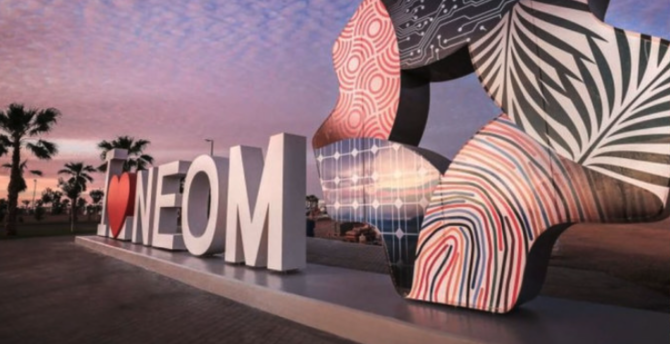RIYADH: Saudi Arabia’s state-backed initiatives, including NEOM and Vision 2030, are driving growth in the construction sector, attracting substantial domestic and international investments, an analysis showed.
In its latest report, global consultancy firm Turner & Townsend highlighted that the construction activities are also driven by the Kingdom’s preparations for EXPO 2030 and the 2034 FIFA World Cup.
This comes as Saudi Arabia emerged as the leader in global construction activity for the first quarter, with the Kingdom having $1.5 trillion of projects in the pipeline, according to a report released earlier this month by real estate services firm JLL.
The JLL analysis further highlighted that the Kingdom accounted for a 39 percent share of the total construction projects in the Middle East and North Africa region, valued at $3.9 trillion.
“The stand-out story is the accelerated development of Saudi Arabia, where vast ambitions are being realized via projects like The Line, King Salman Park and Diriyah Gate,” said Mark Hamill, director and head of Middle East real estate and major programs, at Turner & Townsend.
The Line is a linear smart city currently under construction in Saudi Arabia’s $500-billion megacity NEOM, while King Salman Park is a 4102-acre large-scale public park and urban district which is being developed in Riyadh.
The report highlighted that despite political uncertainties, substantial investments are driving growth in the Gulf region as countries seek to diversify beyond traditional energy sources.
This occurs against the backdrop of Turner & Townsend ranking the Kingdom as the 19th most expensive country for construction globally, contrasting sharply with the US, which dominated the top 10 list.
The report further noted that construction cost inflation in Riyadh is easing from the highs of 7.0 percent seen in 2023, but is forecasted to remain high at 5.0 percent through 2024.
The analysis also highlighted Saudi Arabia’s efforts to attract global corporate occupiers through its Regional Headquarters Program.
It added: “This scheme encourages companies to launch offices in Saudi Arabia and there are cost advantages to office investment with an average high-rise central business district office in Riyadh costing a relatively low $2,266 per sq. m.”
The UK-based company also pointed out that Saudi Arabia is also facing a shortage of skilled labor which is crucial to materialize and fulfill construction activities as planned.
“Skilled labor shortages are also keeping costs elevated as Saudi Arabia suffers from a distinct shortage of skilled labor that is vital to deliver its most ambitious programs. The talent and resources needed for giga-projects in the country are also stretching overall supply chain capacity across the Middle East,” said the report.
Regional insight
According to the report, Qatar’s capital city Doha is the second most expensive market in the region at $2,096 per sq. m.
However, following the high output in the lead-up to the 2022 FIFA World Cup, construction cost inflation is projected to fall from 3.5 percent in 2023 to 2.5 percent in 2024, the study said.
On the other hand, Dubai has an average cost to build of $1,874 per sq. m., supported by high tourism activity and residential sector development.
“The UAE has been a hotspot for tourism in the region in recent years and its relatively low cost of construction, when compared with Western markets, still makes it an attractive place to build the hubs and amenities for international visitors,” said the report.
It added: “In Dubai, residential development is buoying the local market as the city aims to support its growing population. Its attractiveness as a market is bolstered by its comparably low cost of construction.”
On the other hand, Abu Dhabi is the fourth most expensive market in the Middle East at $1,844.2 per sq. m.
Hamill noted that there are considerable real estate opportunities in the UAE and Qatar as inflation cools.
He added: “Nevertheless, with labor capacity being stretched across the region, clients will need to review their procurement and contracting models to help mitigate supply chain disruption and maximize the potential opportunities on offer.”
Global outlook
The report revealed that construction pipelines globally are set to grow this year, but skill shortage could remain a major concern.
“The global real estate market is emerging from a challenging period of inflationary pressures, volatility and disruption. Our sector has proved resilient, and a focus on building new approaches to procurement and supply chain development to drive efficiency and productivity is opening new opportunities across many markets,” said Neil Bullen, managing director, global real estate at Turner & Townsend.
He added: “Clients need to understand where labor bottlenecks may constrain their capital investment programs and work collaboratively with the supply chain to understand how best to mitigate the risk to delivery.”
The US dominated the rankings of the most expensive places to build, with six cities from the country grabbing their spots in the top 10 list.
New York retained its position as the most expensive market to build in for the second year running at an average cost of $5,723 per sq. m., closely followed by San Francisco at $5,489.
Zurich came in the third spot as it surpassed Geneva in the ranking with an average cost of $5,035 per sq. m. Geneva, which came in the fourth spot, averaged $5,022 per sq. m.
US cities Los Angeles, Boston, Seattle and Chicago came in the fifth, sixth, seventh and eighth spots respectively in the list.
From Asia, Hong Kong came in the ninth spot with an average cost of $4,500, followed by London at $4,473.
The report also highlighted that implementing technology in the construction sector could help overcome various challenges faced by the industry.
“Accelerating digitalization also presents a huge opportunity, but this requires us to keep up with the demand for skilled labor, and persistent shortages risk constraining potential growth,” said Bullen.
He added: “As interest rate cuts become an increasing possibility for many markets, and pent-up investor appetite can be unlocked, capacity could be tested still further.”






















